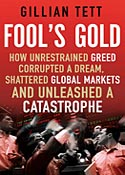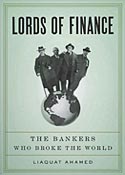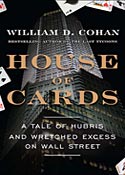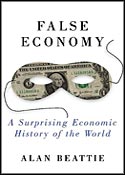Five of the best books on the financial crash
Eight months after the collapse of Lehman Brothers, the book shelves are groaning with new finance books explaining the crash. Tim Bennett looks at five of the best.
Get the latest financial news, insights and expert analysis from our award-winning MoneyWeek team, to help you understand what really matters when it comes to your finances.
You are now subscribed
Your newsletter sign-up was successful
Want to add more newsletters?

Twice daily
MoneyWeek
Get the latest financial news, insights and expert analysis from our award-winning MoneyWeek team, to help you understand what really matters when it comes to your finances.

Four times a week
Look After My Bills
Sign up to our free money-saving newsletter, filled with the latest news and expert advice to help you find the best tips and deals for managing your bills. Start saving today!
Eight months after the collapse of Lehman Brothers, the book shelves are groaning with new finance books explaining the crash. Tim Bennett looks at five of the best.

Little, Brown, £18.99
Few financial writers have been more closely followed during this crisis than the British Press Awards Journalist of the Year 2009, Gillian Tett. As The Spectator notes, her "analytical and penetrating" articles for the FT have been compulsory reading in City circles for years. Tett is a former anthropologist and so, as Nicholas Shakespeare notes in The Daily Telegraph, she looks at financiers as if at "a strange Tajikistan tribe".
MoneyWeek
Subscribe to MoneyWeek today and get your first six magazine issues absolutely FREE

Sign up to Money Morning
Don't miss the latest investment and personal finances news, market analysis, plus money-saving tips with our free twice-daily newsletter
Don't miss the latest investment and personal finances news, market analysis, plus money-saving tips with our free twice-daily newsletter
Here, that tribe is a small team at investment bank JP Morgan who harnessed "computers to create a fiendishly complex means of shifting risk from banks to investors" via a new breed of financial instrument, the credit derivative. Once these contracts, which let banks bet on whether a loan or bond might default, infected the subprime mortgage market, mayhem was all but guaranteed with ill-equipped regulators caught "behind the curve at every stage". Tett says only seven people were tasked with monitoring $4trn in Wall Street assets.
Given the subject, it's not for absolute beginners with its "jargon and stupefying numbers", says Dominic Lawson in The Times. But the human aspect more than compensates: using "raw private communications" between players at JP Morgan creates "pathos as well as pace". Tett offers "no solutions", but her account of the widescale failure to control the derivatives market is "devastating".

Lords of Finance by Liaquat Ahamed
Tantor Media, £17.49
You'll "shudder" with recognition when you read this, says Joe Nocera in The New York Times. It describes the West after World War One; a time of "bubbles followed by busts and of a cascading series of events that led to the Great Depression". The "Lords" are the central bankers of that era: Benjamin Strong of the Federal Reserve; Montagu Norman of the Bank of England; Emile Moreau of the Banque de France; and Reichsbank's Hjalmar Schacht. All were brilliant, yet made "mistake after mistake".
Their biggest, says The Economist, was being united by a "belief that they knew best". Maintaining the gold standard became dogma to the point where US interest rates were kept deliberately low so Britain could borrow to stay on the gold standard. The resulting credit-fuelled bubble on Wall Street led to the 1929 crash. As Norman later conceded in 1948, "we achieved absolutely nothing". With their focus on inflation targeting, today's central bankers could make similar mistakes, says The Economist.
The Storm by Vince Cable
Atlantic Books, £14.99
One politician saw the financial storm coming. In 2003, the then-chancellor, Gordon Brown, shot down Vince Cable, the Lib Dem Treasury spokesman, for suggesting UK prosperity rested too heavily on rising house prices. Cable, a former Shell economist, was right.
Here Cable argues that Britain's housing and debt bubbles have been larger than elsewhere and our past profligacy means our government has little room to help by cutting taxes or raising spending. Not everyone will buy his solutions, such as splitting highly regulated retail activities and riskier investment banking. Yet this is a "timely analysis" of what went wrong, says Tim Harford in Management Today.

House of Cards by William D Cohan
AllenLane, £25
This 468-page "blow by blow" account of the ten days that lead to the implosion of Bear Stearns is as "gripping"as a novel, says The Guardian's Ruth Sutherland. Cohan has the rare gift of understanding the "complex goings-on" surrounding the fall of the bank, while being able to make them comprehensible, says The New York Times. He captures the "colourful and flawed characters who ran Bear". One, former CEO Alan Schwarz, sums up what went wrong in global banking: "We all fucked up. Government. Ratings agencies. Wall Street. Commercial Banks. Regulators. Investors. Everybody." An "annoyingly hard to put down" book, says BusinessWeek.

False Economy by Alan Beattie
Riverhead Books, $26.95, (published in the UK in June)
Beattie, says The Economist, uses "extraordinary stories of economic triumph and disaster" to distill lessons from history to show what many readers may already suspect: most economic successes and failures take us by surprise. The book is laced with case studies (such as why Peru, not California, dominates the US asparagus market), but is short on answers, making it a "fascinating", yet "maddening" read, says the FT.
Get the latest financial news, insights and expert analysis from our award-winning MoneyWeek team, to help you understand what really matters when it comes to your finances.
Tim graduated with a history degree from Cambridge University in 1989 and, after a year of travelling, joined the financial services firm Ernst and Young in 1990, qualifying as a chartered accountant in 1994.
He then moved into financial markets training, designing and running a variety of courses at graduate level and beyond for a range of organisations including the Securities and Investment Institute and UBS. He joined MoneyWeek in 2007.
-
 Can mining stocks deliver golden gains?
Can mining stocks deliver golden gains?With gold and silver prices having outperformed the stock markets last year, mining stocks can be an effective, if volatile, means of gaining exposure
-
 8 ways the ‘sandwich generation’ can protect wealth
8 ways the ‘sandwich generation’ can protect wealthPeople squeezed between caring for ageing parents and adult children or younger grandchildren – known as the ‘sandwich generation’ – are at risk of neglecting their own financial planning. Here’s how to protect yourself and your loved ones’ wealth.